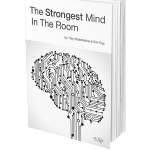“The goal of meditation isn’t to control your thoughts, it’s to stop letting your thoughts control you.”
Jon Andre started practicing meditation 20 years ago as a way to find calm and reduce stress. It’s made such an impact on his life that he transitioned to becoming a meditation teacher through his work at meditationSHIFT. He told us more about his practice and the benefits he has received from daily, consistent practice.
Why did you start meditating? What was your goal?
My goal in the beginning was simple: I wanted to reduce stress. This is important, because it seems trendy these days to say that there should be no goals in meditation. I disagree. There needs to be something that brings you to the practice in the beginning, and motivates you to turn it into a habit that you do every day. If there isn’t, you will most likely try meditation once or twice and then give up. Mindfulness and meditation offer a wide range of benefits, but you have to develop a consistent practice to realize them. The only way to develop that consistent practice is to have a reason to try in the first place.
What is your meditation routine?
I do “formal” meditation a minimum of twice a day, for 20 minutes each session. More important, though, I work to bring mindfulness to everything I do during my day when I am not formally meditating.
For me, meditation is like the practice a performer or athlete does to execute well on the stage or in the game. My formal meditation sessions (“practice”) enable me to bring mindfulness to the rest of my life (the “stage” or “game,” in this analogy).
Too many people look at meditating as a chore. This instills a negative mindset, and makes it easier to give up. If, however, you view it from the standpoint of what it can do for you when you aren’t actually meditating, you start to see it more as a way of life – not an item to check off your “todo list.”
Can you tell me a story about how meditation improved your performance?
I don’t think there is one story I can isolate, because everything is connected. Instead, I look at how meditation has improved my life as a whole over the last 20 years. Meditation teaches you to cultivate awareness of your mind-made activity, and in doing so you learn not to get attached to it (or swept away by it). The applications for this are numerous: it can help with stress, worry, fear, anxiety, depression, regret, self-confidence, etc. The foundation for all of these things–what we commonly refer to as the “struggles of life”–is our mind. And, once you learn to understand your mind and how to deal with the challenges it creates, your life can improve dramatically.
I realized these benefits and many others over the past two decades, and my direct experience compelled me to begin teaching mindfulness and meditation to others. In my opinion, understanding your mind and developing a consistent practice are the most important things you can do for your happiness, health, and well-being. I started my company, meditationSHIFT, over 11 years ago. Between our self-study course, seminars, and speaking engagements, we help individuals, groups, and businesses realize the benefits of a consistent practice.
Do you think meditation gives you a competitive edge? Why?
Actually, meditation has helped me realize that I don’t need to be competitive with others. By learning to observe my mind, my thoughts, and all the other mental activity, I see that the concept of “competition” is a mind-made construct that only serves to separate me from everyone else, and promote a “me vs. you” mentality.
What I have learned through a consistent meditation practice is that I am not this entity alone on an island, struggling against the world. Instead, I am connected with everyone and everything else. We all strive for the same thing: to avoid pain and increase pleasure. Some of us do it in ways that are labeled “bad” and “unacceptable,” but we are all still striving for the same thing regardless of our tactics.
When thoughts pop up that I’m better than someone else or that someone else is better than me, I see them for what they are: temporary. They can go the same as they came, provided I don’t cling to them and turn them into “my story.”
Meditation helps you see things as they are, and it helps you reverse conditioning that you have developed over a lifetime. From this standpoint, you can say it makes you better and gives you an edge. But, that advantage should be used to contribute to the world, as opposed to distinguishing yourself from it.
What is the biggest misconception about meditation?
The biggest misconception is that you are supposed to stop thinking, or that you are supposed to control your thoughts. People come to the practice with these misconceptions, and they quickly grow frustrated when they are unable to accomplish them. The goal of meditation isn’t to control your thoughts, it’s to stop letting your thoughts control you.
Don’t try to stop thinking: it will continue to happen. And don’t try to control your thoughts. The content of your mind doesn’t matter. Instead, cultivate awareness, learn to observe non-judgmentally, and condition yourself to not follow your mind wherever it leads. If you do this on a consistent basis, you learn that there is this underlying state of contentment that is always there. You just have to strip away the mental baggage that is piled on top of it.
Get your free chapter of The Strongest Mind in the Room: How Meditation Boosts Human Performance. Find free guided meditations on our How to Meditate Lift Guide.
[Tweet “”The goal of meditation isn’t to control your thoughts, it’s to stop letting them control you.” – @5rulesforlife via @coachdot”]
